UPDATE - Power generation in Nigeria rises sharply to highest in over two months
Nigeria generated a total of 95,116.18MWh of energy on Tuesday, 12th July
2022, improving by 5% compared to 90,621.28MWh recorded in the previous day, representing the highest in over two months.This is according to information from the Transmission Company of Nigeria (TCN). The last time Nigeria’s energy topped 95,000MWh was 4th May 2022, when electricity generation hit 96,278.96MWh.
In the same vein, power supply increased by 5% to 93,857.566MWh on Tuesday, from 89,393.08MWh sent out on Monday. This implies that 98.64% of the total power generated was sent out to Distribution Companies.
It is worth noting that, despite the increase, electricity generation and supply in Nigeria is still crippling below the minimum 105,000MWh of electricity required to record stable power supply in the country.
Energy generation peaked at 4,343.2MW on Tuesday, while off-peak generation was stated at 3,572.8MW. The highest frequency recorded during the day was 50.92Hz while the lowest was 49Hz.
Highlight (12th July 2022)
- Peak generation – 4,343.2MW (+8.0%)
- Off-peak generation – 3,572.8MW (+1.5%)
- Energy generated – 95,116.18MWh (+5.0%)
- Energy sent out – 93,857.56MWh (+5.0%)
Electricity update: Power supply in Nigeria improves to 89,393MWh
Nigeria’s electricity supply improved to 89,393.08MWh on Monday, 11th July 2022, representing a 2.2% increase compared to 87,487.83MWh recorded in the previous day. This is according to information from the Transmission Company of Nigeria (TCN).
The improvement in electricity supply is following a 2.1% increase in power generation to 90,621.28MWh on Monday, compared to 88,718.95MWh of energy that was generated on Sunday. This implies that 98.64% of the total power generated was sent out to Distribution Companies.
Despite the increase, electricity generation and supply in Nigeria is still crippling below the minimum 105,000MWh of electricity required to record stable power supply in the country.
Energy generation peaked at 4,022.2MW on Monday, while off-peak generation was stated at 3,532.3MW. The highest frequency recorded during the day was 50.86Hz while the lowest was 49Hz.
Highlight (11th July 2022)
- Peak generation – 4,022.2MW (+2.9%)
- Off-peak generation – 3,521.3MW (+8.5%)
- Energy generated – 90,621.28MWh (+2.1%)
- Energy sent out – 89,393.08MWh (+2.2%)
Nigeria’s electricity generation improves to 92.7GWh, highest in over 2 months
Nigeria’s electricity generation rose to its highest level in over two months on Friday, 8th July 2022 reaching a total generation of 92.71GWh from 90.69GWh recorded on Thursday. The last time the Power Generation companies recorded this much was 4th May 2022.
This is according to information from the Transmission Company of Nigeria (TCN).
In the same vein, electricity supply also rallied significantly on Friday to 91.45GWh compared to 89.44GWh that was sent out the previous day, Notably, 98.63% of the power generated on Friday was sent out to distribution companies.
Despite the increase, electricity generation and supply in Nigeria is still crippling below the minimum 105,000MWh of electricity required to record stable power supply in the country.
Energy generation peaked at 4,102.4MW on Friday, while off-peak generation was stated at 3,567.1MW. The highest frequency recorded during the day was 50.86Hz while the lowest was 59.12Hz.
Highlight (8th July 2022)
- Peak generation – 4,102.7MW (+2.9%)
- Off-peak generation – 3,567.1MW (-1.3%)
- Energy generated – 92,712.03MWh (+2.2%)
- Energy sent out – 91,446.17MWh (+2.2%)
Electricity supply in Nigeria rises to highest in over a month at 85,874MWh
Nigeria’s electricity supply rose by 7.11% to 85,874.18MWh on Wednesday, 6th July 2022, representing the highest electricity supply in over one month. This is according to information from the Transmission Company of Nigeria (TCN).
The increase in energy supply is following a 6.96% energy generation from 81,310.5MWh recorded on Tuesday to 86,967.76MWh on Wednesday. According to the information from TCN, 98.74% of the energy generated was distributed to the DisCos.
Similarly, peak generation increased by 1.96% to 3,800.6MW, while off-peak generation stood at 3,457.5MW, representing a 9.47% rise compared to the previous day. Despite the increase, electricity generation and supply in Nigeria is still crippling below the minimum 105,000MWh of electricity required to record stable power supply in the country.
Highlight (6th July 2022)
- Peak generation – 3,800.6MW (+1.96%)
- Off-peak generation – 3,457.5MW (+9.47%)
- Energy generated – 86,967.76MWh (+6.96%)
- Energy sent out – 85,874.18MWh (+7.11%)
The highest frequency for the day was 50.39Hz, while the lowest frequency was 49.07Hz.
Electricity update: Power supply in Nigeria drops to 75,641.98MWh
Nigeria’s electricity supply dipped on Sunday, 3rd July 2022 by 3.9% to 75,641.98MWh compared to 78,726.11MWh sent out to distributing companies during the previous day. This is following a 4.1% decline in energy production to 76,659.42MWh on Sunday.
Specifically, total energy generated on Sunday was 4.1% lower than the 79,955.89MWh generated on Saturday. This is according to information from the Transmission Company of Nigeria (TCN).
Similarly, peak generation dropped by 5.6% to 3,346.3MW, while off-peak generation stood at 2,998.8MW, representing a 5.9% decline compared to the previous day. Meanwhile, 98.67% of the total energy generated was supplied to DisCos on Sunday.
Electricity generation and supply in Nigeria is still crippling below the minimum 105,000MWh of electricity required to record stable power supply in the country.
Highlight (3rd July 2022)
- Peak generation – 3,346.3MW (-5.6%)
- Off-peak generation – 2,998.8MW (-5.9%)
- Energy generated – 76,659.42MWh (-4.1%)
- Energy sent out – 75,641.98MWh (-3.9%)
The highest frequency for the day was 50.38Hz, while the lowest frequency was 49Hz.
Electricity update: Nigeria’s power generation peaks at 3,629MW
Nigeria’s electricity generation peaked at 3,629.5MW on Sunday, 26th June 2022, representing a 2.6% decline compared to a peak of 3,725.1MW recorded in the previous day. This is according to information from the Transmission Company of Nigeria (TCN).
On the other hand, off-peak generation improved by 10.9% to 3,327.5MW on Sunday, compared to 2,999.6MW recorded on Saturday, when total energy generated slumped to 79,872.55MWh.
Total generated power increased by 4.8% to 83,688.26MWh from 79,872.55MWh generated in the previous day, while supplied energy also increased by 5.1% to 82,654.31MWh from 78,680.37MWh sent out on Saturday.
Despite the improvement, electricity generation and supply in Nigeria is still largely below the minimum 105,000MWh of electricity required to record stable power supply in the country.
Highlight (26th June 2022)
- Peak generation – 3,629.5MW (-2.6%)
- Off-peak generation – 3,327.5MW (+10.9%)
- Energy generated – 83,688.26MWh (+4.8%)
- Energy sent out – 82,654.31MWh (+5.1%)
The highest frequency for the day was 50.58Hz, while the lowest frequency was 49.41Hz.
Electricity update: Power generation in Nigeria improves to 86,983MWh
Nigeria’s electricity generation improved by 2.96% on Friday to 86,983.17MWh compared to 84,481.7MWh generated in the previous day. This is according to information from the Transmission Company of Nigeria (TCN).
Similarly, electricity supply to the distribution companies (DisCos) also increased by 3% to 85,640.37MWh on Friday from 83,144.02MWh sent out on Thursday. Despite the improvement, electricity generation and supply in Nigeria is still largely below the minimum 105,000MWh of electricity required to record stable power supply in the country.
Meanwhile, peak generation increased slightly by 0.85% to 3,919.9MW, while off-peak generation stood at 2,909.6MW. Notably, 98.46% of the generated energy in the day under review was sent out to Distributing Companies.
Highlight (24th June 2022)
- Peak generation – 3,919.9MW (+0.85%)
- Off-peak generation – 2,909.6MW (-12.97%)
- Energy generated – 86,983.17MWh (+2.96%)
- Energy sent out – 85,640.37MWh (+3%)
- The highest frequency for the day was 51.33Hz, while the lowest frequency was 49.68Hz.
Electricity update: Nigeria’s power generation improves to 79,578MWh
Nigeria’s electricity generation improved by 4.13% on Monday to 79,578.43MWh compared to 76,420.52MWh generated in the previous day. This is according to information from the Transmission Company of Nigeria (TCN).
Similarly, electricity supply to the distribution companies (DisCos) also increased by 4.77% to 78,529.1MWh on Monday from 75,001.81MWh sent on Sunday. Despite the improvement, electricity generation and supply in Nigeria is still largely below the minimum 105,000MWh of electricity required to record stable power supply in the country.
Meanwhile, peak generation increased slightly by 0.57 to 3,540.6MW, while off-peak generation stood at 3,176.6MW. Notably, 98.74% of the generated energy in the day under review was sent out to Distributing Companies.
Highlight (20th June 2022)
- Peak generation – 3,540.6MW (+0.57%)
- Off-peak generation – 3,176.6MW (+10.01%)
- Energy generated – 79,578.43MWh (+4.13%)
- Energy sent out – 78,579.21MWh (+4.77)
The highest frequency for the day was 50.46Hz, while the lowest frequency was 49.02Hz.
Nigeria’s electricity supply falls to 75,001MWh as energy crisis lingers
Electricity supply in Nigeria fell by 6.1% on Sunday, 19th June 2022 to 75,001.81MWh compared to 79,864.63MWh supplied in the previous day on Saturday. This is according to information from the Transmission Company of Nigeria (TCN).
Similarly, generated electricity by the Generating companies also declined by 5.5% to 76,420.52MWh on Sunday from 80,903.35MWh generated on Saturday. Electricity generation and supply is still largely below the minimum 105,000MWh of electricity required to record stable power supply in the country.
Meanwhile, peak generation dropped by 3.6% to 3,520.6MW, while off-peak generation stood at 2,887.5MW. Notably, 98.14% of the generated energy in the day under review was sent out to Distributing Companies.
Highlight (19th June 2022)
- Peak generation – 3,520.6MW (-3.6%)
- Off-peak generation – 2,887.5MW (-9.6%)
- Energy generated – 76,420.52MWh (-5.5%)
- Energy sent out – 75,001.81MWh (-6.1)
The highest frequency for the day was 50.47Hz, while the lowest frequency was 49.02Hz.
Electricity update: Nigeria’s power supply falls to 77,964MWh
Electricity supply in Nigeria recorded a marginal decline on Thursday, 16th June 2022, falling by 1.8% to 77,964.55MWh compared to 79,380.6MWh supplied during the previous day. This is according to information from the Transmission Company of Nigeria (TCN).
Similarly, generated electricity by the Generating companies also declined by 2% to 79,072.56MWh on Thursday from 80,656.91MWh generated on Wednesday. Electricity generation and supply is still gradually recovering from the crash recorded earlier in the week when the national grid experienced some disruptions, causing blackouts in some regions of the country.
Meanwhile, peak generation dropped by 3.7% to 3,432.2MW, while off-peak generation stood at 3,121.8MW. Notably, 98.6% of the generated energy in the day under review was sent out to Distributing Companies.
Highlight (16th June 2022)
- Peak generation – 3,432.2MW (-3.7%)
- Off-peak generation – 3,121.8MW (-0.4%)
- Energy generated – 79,072.56MWh (-2.0%)
- Energy sent out – 77,964.55MWh (-1.8%)
The highest frequency for the day was 50.78Hz, while the lowest frequency was 49.3Hz.
Electricity update: Power generation in Nigeria peaks at 3,563MW
Electricity generation in Nigeria peaked at 3,563.3MW on Wednesday, representing a 1.89% uptrend compared to 3,497.1MW recorded on Tuesday, 14th June 2022. This is according to information from the Transmission Company of Nigeria (TCN).
Off-peak generation also rose by 5.37% to 3,132.9MW on Wednesday as against 2,973.2MW of electricity recorded in the previous day. Meanwhile, total energy generation improved by 2.1% to 80,656.91MWh, which represents a gradual recovery from downturn recorded earlier in the week as a result of grid shutdown.
Similarly, energy supply increased by 1.51% to 79,380.6MWh on Wednesday, 15th June 2022 compared to 78,202.37MWh sent out by the generating companies in the previous day. Notably, 98.42% of the generated energy in the day under review was sent out to Distributing Companies.
Highlight (15th June 2022)
- Peak generation – 3,563.3MW (+1.89%)
- Off-peak generation – 3,132.9MW (+5.37%)
- Energy generated – 80,656.91MWh (+2.05%)
- Energy sent out – 79,380.6MWh (+1.51%)
The highest frequency for the day was 51.11Hz, while the lowest frequency was 49.12Hz.
Electricity update: Power generation in Nigeria rebounds to 79.04GWh
Nigeria’s electricity generation revamped on Tuesday 14th June 2022 to 79.04GWh from the 67.17GWh generated on Monday. This is following a significant downturn at the beginning of the week, when power generation slumped to 68.9GWh on Sunday.
This is according to information from the Transmission Company of Nigeria (TCN).
Similarly, energy supply increased by 17.8% to 78.2GWh on Tuesday, 14th June 2022 compared to 66.39GWh sent out by the generating companies in the previous day.
Meanwhile, energy generation peaked at 3,497.4MW on Tuesday, while off-peak was 2,973MW. Notably, 98.94% of the generated energy in the day under review was sent out to Distributing Companies.
Highlight (14th June 2022)
- Peak generation – 3,497.1MW (+4.9%)
- Off-peak generation – 2,973.2MW (+99.5%)
- Energy generated – 79,039.71MWh (+17.7%)
- Energy sent out – 78,202.37MWh (+17.8%)
The highest frequency for the day was 50.48Hz, while the lowest frequency was 49Hz.
Electricity update: Power supply in Nigeria falls further to 67,172MWh
Nigeria recorded a further drop in electricity generation and supply on Monday, following a significant downward trend on Sunday. Notably, energy generation fell on Monday by 2.4% to 67,172.13MWh from 66,398.84MWh recorded in the previous day.
This is according to information from the Transmission Company of Nigeria (TCN).
Similarly, energy supply declined by 2.1% to 66,398.84MWh on Monday, 13th June 2022 compared to 67,790.1MWh sent out by the generating companies on Sunday.
Meanwhile, energy generation peaked at 3,333.6MW on Monday, while off-peak was 1,490MW. Notably, 98.8% of the generated energy in the day under review was sent out to Distributing Companies.
Highlight (13th June 2022)
- Peak generation – 3,333.6MW (-10%)
- Off-peak generation – 9MW (+16,455%)
- Energy generated – 67,172.13MWh (-2.4%)
- Energy sent out – 66,398.84MWh (-2.1%)
The highest frequency for the day was 51.31Hz, while the lowest frequency was 49.18Hz.
Electricity update: Nigeria’s power generation falls massively to 68,856MWh
Nigeria recorded a huge drop in electricity generation and supply on Sunday, falling by 18.76% to 68,856.37MWh of generated power as against 84,757.11MWh recorded in the previous day.
This is according to information from the Transmission Company of Nigeria (TCN).
Similarly, the energy supply dipped significantly by 18.84% to 67,790.MWh on Sunday, 12th June 2022 compared to 83,524.39MWh sent out by the generating companies on Saturday.
Meanwhile, energy generation peaked at 3,703MW on Sunday, while off-peak was 9MW. Notably, 98.45% of the generated energy in the day under review was sent out to Distributing Companies.
Highlight (12th June 2022)
- Peak generation – 3,703MW (+0.48%)
- Off-peak generation – 9MW (-99.73%)
- Energy generated – 68,856.37MWh (-18.76%)
- Energy sent out – 67,790.1MWh (-18.84%)
The highest frequency for the day was 51.17Hz, while the lowest frequency was 48.4Hz.
Electricity update: Power supply in Nigeria falls marginally to 76,375MWh
Electricity supply in Nigeria recorded a marginal drop on Wednesday to 76,375.48MWh, is 0.6% lower than the 76,851.08MWh sent in the previous day. This is according to information from the Transmission Company of Nigeria (TCN).
The decline in energy supply is on the back of a similar 0.6% decline in energy generation on Wednesday to 77,416.19MWh from 77,917.94MWh recorded on Tuesday, 7th June 2022.
Meanwhile, energy generation peaked at 3,433.5MW on Wednesday, while off-peak was 3,031.5MW. Notably, 98.63% of the generated energy in the day under review was sent out to Distributing Companies.
Nigeria’s energy generation and supply continue to remain below the minimum 105,000MWh required to record some level of stability in power supply in the country. Nigerians continue to grapple with epileptic power supply as a result of disruptions at the national grip and inability to operate at full capacity.
Highlight (8th June 2022)
- Peak generation – 3,433.5MW (-2%)
- Off-peak generation – 3,031.5MW (+4.4%)
- Energy generated – 77,416.19MWh (-0.6%)
- Energy sent out – 76,375.48MWh (-0.6%)
The highest frequency for the day was 50.46Hz, while the lowest frequency was 49Hz.
The Ministry of Power through a statement issued and signed by the Special Assistant to the Minister of Power on Media, Malam Sanusi on Saturday, attributed the recent electricity dip to the partial shutdown of the Obem gas plant.
Why this matters
Power is an essential need for many Nigerians and their businesses, especially given the surge in the cost of alternative energy amidst the global energy crisis. The cost of power in the country has gone up and is further exacerbated by constant disruption in electricity supply.
Businesses now have to spend a high cost on energy, while others who cannot afford other forms of electricity are forced to endure the epileptic power supply.
Electricity update: Nigeria’s power generation peaks at 3,504MW
Nigeria’s electricity generation improved by 2.1% on Tuesday to 77,917.94MWh, representing a further increase compared to 76,297.58MWh recorded on Monday. This is according to information from the Transmission Company of Nigeria (TCN).
Similarly, energy supply increased by 2.2% on Tuesday from 75,197.46MWh sent out by the generating companies on Monday to 76,851.08MWh.
Energy generation peaked at 3,504.9MW on Tuesday, while off-peak was 2,903.4MW. Notably, 98.63% of the generated energy in the day under review was sent out to Distributing Companies.
Power generation and supply had declined by 15.7% last week Saturday, falling to its lowest levels since 9th April 2022. Energy generation averaged at 76,983.67MWh between the 29th of May and the 4th of June 2022, lower than the average 86,336.55MWh recorded in the previous week.
Nigeria’s energy generation and supply continue to remain below the minimum 105,000MWh required to record some level of stability in power supply in the country. Nigerians continue to grapple with epileptic power supply as a result of disruptions at the national grip and inability to operate at full capacity.
Highlight (7th June 2022)
- Peak generation – 3,504.9MW (+2.8%)
- Off-peak generation – 2,903.4MW (-3.9%)
- Energy generated – 77,917.94MWh (+2.1%)
- Energy sent out – 76,851.08MWh (+2.2%)
The highest frequency for the day was 50.49Hz, while the lowest frequency was 49Hz.
The Ministry of Power through a statement issued and signed by the Special Assistant to the Minister of Power on Media, Malam Sanusi on Saturday, attributed the recent electricity dip to the partial shutdown of the Obem gas plant.
Why this matters
Power is an essential need for many Nigerians and their businesses, especially given the surge in the cost of alternative energy amidst the global energy crisis. The cost of power in the country has gone up and is further exacerbated by constant disruption in electricity supply.
Businesses now have to spend a high cost on energy, while others who cannot afford other forms of electricity are forced to endure the epileptic power supply.
Electricity update: Energy generation in Nigeria revamps to 76,297.6MWh
Nigeria’s electricity generation rebounded further on Monday, 6th June 2022 following a significant crash recorded in the previous week. Energy generation improved by 7.5% on Monday to 76,297.58MWh compared to 70,943.35MWh generated on Sunday.
This is according to information from the Transmission Company of Nigeria (TCN). In the same vein, energy supply increased by 7.6% to 75,197.46MWh from 69,886.65MWh recorded in the previous day.
Energy generation peaked at 3,409.5MW on Monday, while off-peak was 3,021.7MW. Notably, 98.56% of the generated energy in the day under review was sent out to Distributing Companies.
Power generation and supply had declined by 15.7% on Saturday, falling to its lowest levels since 9th April 2022. Energy generation averaged at 76,983.67MWh between the 29th of May and the 4th of June 2022, lower than the average 86,336.55MWh recorded in the previous week.
Nigeria’s energy generation and supply continue to remain below the minimum 105,000MWh required to record some level of stability in power supply in the country. Nigerians continue to grapple with epileptic power supply as a result of disruptions at the national grip and inability to operate at full capacity.
Highlight (6th June 2022)
- Peak generation – 3,409.5MW (+5%)
- Off-peak generation – 3,021.7MW (+19.5%)
- Energy generated – 76,297.58MWh (+7.5%)
- Energy sent out – 75,197.46MWh (+7.6%)
The highest frequency for the day was 50.87Hz, while the lowest frequency was 49Hz.
The Ministry of Power through a statement issued and signed by the Special Assistant to the Minister of Power on Media, Malam Sanusi on Saturday, attributed the recent electricity dip to the partial shutdown of the Obem gas plant.
Why this matters
Power is an essential need for many Nigerians and their businesses, especially given the surge in the cost of alternative energy amidst the global energy crisis. The cost of power in the country has gone up and is further exacerbated by constant disruption in electricity supply.
Businesses now have to spend a high cost on energy, while others who cannot afford other forms of electricity are forced to endure the epileptic power supply.
Electricity update: Nigeria’s power generation rebounds slightly from Saturday’s crash
Nigeria’s electricity generation rebounded on Sunday, 5th June 2022 following a significant crash recorded in the previous day. Energy generation improved by 12.9% on Sunday to 70,943.35MWh compared to 62,837.51MWh recorded on Saturday.
This is according to information from the Transmission Company of Nigeria (TCN). In the same vein, energy supply increased by 12.9% to 69,886.65MWh from 61,910.44MWh recorded on Saturday.
Power generation and supply had declined by 15.7% on Saturday, falling to its lowest levels since 9th April 2022. Energy generation averaged at 76,983.67MWh between the 29th of May and the 4th of June 2022, lower than the average 86,336.55MWh recorded in the previous week.
Nigeria’s energy generation and supply has fallen further below the minimum 105,000MWh required to record some level of stability in power supply in the country. Nigerians continue to grapple with epileptic power supply as a result of disruptions at the national grip and the inability to operate at full capacity.
Highlight (5th June 2022)
- Peak generation – 3,246.5MW (+13.6%)
- Off-peak generation – 2,527MW (+1.3%)
- Energy generated – 70,943.35MWh (+12.9%)
- Energy sent out – 69,886.65MWh (+12.9%)
The highest frequency for the day was 51.12Hz, while the lowest frequency was 49.03Hz.
The Ministry of Power through a statement issued and signed by the Special Assistant to the Minister of Power on Media, Malam Sanusi on Saturday, attributed the recent electricity dip to the partial shutdown of the Obem gas plant.
Why this matters
Power is an essential need for many Nigerians and their businesses, especially given the surge in the cost of alternative energy amidst the global energy crisis. The cost of power in the country has gone up and is further exacerbated by constant disruption in electricity supply.
Businesses now have to spend a high cost on energy, while others who cannot afford other forms of electricity are forced to endure the epileptic power supply.
Electricity update: Power generation in Nigeria improves slightly to 76,444MWh
Nigeria’s electricity generation rebounded slightly on Thursday, as the generating companies generated a total of 76,444.98MWh of energy, representing an increase of 5.13% compared to 72,712.08MWh generated in the previous day.
Energy generation had fallen to an almost two-month low on Wednesday, 1st June 2022, to 72.71GWh. Consequently, energy supply improved by 5.08% to 75,342.22MWh on Thursday.
This is according to information from the Transmission Company of Nigeria (TCN).
Nigeria’s energy generation and supply has fallen further below the minimum 105,000MWh required to record some level of stability in power supply in the country. Nigerians continue to grapple with epileptic power supply as a result of disruptions at the national grip and the inability to operate at full capacity.
Highlight (2nd June 2022)
- Peak generation – 3,302.2MW (+0.53%)
- Off-peak generation – 2,996.6MW (+4.77%)
- Energy generated – 76,444.98MWh (+5.13%)
- Energy sent out – 75,342.22MWh (+5.08%)
The highest frequency for the day was 50.38Hz, while the lowest frequency was 49.12Hz.
Why this matters
Electricity is an essential need for many Nigerians and their businesses, especially given the surge in the cost of alternative energy amidst the global energy crisis. The cost of power in the country has gone up and is further exacerbated by constant disruption in electricity supply.
Nigeria’s electricity generation falls further to 72.7GWh as power outages persist
Nigeria’s electricity generation fell to an almost two-month low on Wednesday, 1st June 2022, falling by 9% to 72.71GWh compared to 79.87GWh recorded in the previous day. This is according to information from the Transmission Company of Nigeria (TCN).
Similarly, energy supply recorded a 9.1% dip to 71.69GWh on Wednesday from 78.84GWh supplied by the generating companies on Tuesday. Energy supply on Wednesday represents 98.61% of the total energy generated.
Nigeria’s energy generation and supply has fallen further below the minimum 105,000MWh required to record some level of stability in power supply in the country. Nigerians continue to grapple with epileptic power supply as a result of disruptions at the national grip and the inability to operate at full capacity.
Highlight (1st June 2022)
- Peak generation – 3,284.7MW (-9.9%)
- Off-peak generation – 2,860.3MW (-1.6%)
- Energy generated – 72,712.1MWh (-9%)
- Energy sent out – 71,699.68MWh (-8.1%)
The highest frequency for the day was 50.42Hz, while the lowest frequency was 48.99Hz.
Why this matters
Electricity is an essential need for many Nigerians and their businesses, especially given the surge in the cost of alternative energy amidst the global energy crisis. The cost of power in the country has gone up and is further exacerbated by constant disruption in electricity supply.
Nigeria’s electricity generation falls to 79,872MWh, lowest in almost one month
Nigeria’s electricity generation fell to an almost one-month low on Tuesday, 31st May 2022, falling by 5.87% to 79,872.94MWh compared to 84,849.41MWh recorded on Monday. This is according to information from the Transmission Company of Nigeria (TCN).
In the same vein, energy supply fell to 78,835.73MWh on Tuesday. This is 5.84% lower than the 83,723.57MWh sent out in the previous day.
Nigeria’s energy generation and supply has fallen further below the minimum 105,000MWh required to record some level of stability in power supply in the country.
Highlight (31st May 2022)
- Peak generation – 3,647.4MW (-1.45%)
- Off-peak generation – 2,905.4MW (-13.79%)
- Energy generated – 79,872.94MWh (-5.87%)
- Energy sent out – 78,835.73MWh (-5.84%)
It is worth noting that the highest frequency for the day was 50.44Hz, while the lowest frequency was 49.02Hz.
Why this matters
Electricity is an essential need for many Nigerians and their businesses, especially given the surge in the cost of alternative energy amidst the global energy crisis. The cost of power in the country has gone up and is further exacerbated by constant disruption in electricity supply.
Electricity update: Nigeria’s energy supply rises to 86.38GWh
Nigeria’s electricity supply recorded a marginal growth of 0.84% on Sunday, 29th May 2022 to 86.38GWh compared to 85.66GWh sent out in the previous day. This is according to information from the Transmission Company of Nigeria (TCN).
The improvement in energy supply is following a 0.93% increase in generated energy on Sunday. Specifically, Nigeria generated a total of 87.64GWh of energy on Sunday, 29th May 2022 as against 86.83GWh generated on the previous day.
It is worth noting that despite the marginal increase Nigeria’s energy generation and supply are still below the minimum 105,000MWh required to record some level of stability in power supply in the country.
Highlight (29th May 2022)
- Peak generation – 3,741.3MW (-0.4%)
- Off-peak generation – 3,504.1MW (+0.73%)
- Energy generated – 87,639.51MWh (+0.93%)
- Energy sent out – 86,382.87MWh (+0.84%)
It is worth noting that the highest frequency for the day was 50.39Hz, while the lowest frequency was 49.04Hz.
Why this matters
Electricity is an essential need for many Nigerians and their businesses, especially given the surge in the cost of alternative energy amidst the global energy crisis. The cost of power in the country has gone up and is further exacerbated by constant disruption in the electricity supply.
Electricity update: Power generation in Nigeria rise by 2.1% to 85.78GWh
Nigeria generated a total of 86.78GWh on Thursday, representing a 2.3% increase compared to 84.84GWh generated on the previous day. This is according to information from the Transmission Company of Nigeria (TCN).
Also, 85.56GWh of energy was sent out by the Generating Companies, which is 2.1% higher than the 83.79GWh sent out on Wednesday. According to the information from the TCN, 98.6% of the generated energy was sent out.
Nigeria’s energy generation and supply are still below the minimum 105,000MWh required to record some level of stability in power supply in the country. Notably, Nigerians continue to grapple with epileptic power supply, with multiple grid disruptions recorded so far in 2022, causing widespread blackouts across the country.
Highlight (26th May 2022)
- Peak generation – 3,865.4MW (+4.8%)
- Off-peak generation – 3,487.3MW (+2.8%)
- Energy generated – 86,781.96MWh (+2.3%)
- Energy sent out – 85,563.15MWh (+2.1%)
It is worth noting that the highest frequency for the day was 50.42Hz, while the lowest frequency was 48.7Hz.
Nigerians continue to suffer from epileptic power supply despite significant interventions by the Central Bank in this sector. According to the apex bank, during the press briefing of the MPC meeting in May 2022, the bank released N15.71 billion between April and May 2022 to the sector players including GenCos and GasCos under the Nigeria Bulk Electricity Trading Plc. Bringing the total disbursement under the facility to N1.3 trillion.
Similarly, the sum of N22.67 billion was also released to Distribution Companies (DisCos) for their Operational Expenditure (OpEx) and Capital Expenditure (CapEx), under the Nigeria Electricity Market Stabilisation Facility – Phase 2 (NEMSF-2). Cumulative disbursement under the NEMSF-2 currently stands at N251.93 billion.
Why this matters
Electricity is an essential need for many Nigerians and their businesses, especially given the surge in the cost of alternative energy amidst the global energy crisis. The cost of power in the country has gone up and is further exacerbated by constant disruption in electricity supply.
Electricity update: Nigeria’s power generation peaks at 3,687.3MW
Nigeria’s electricity generation peaked at 3,687.3MW on Wednesday, falling by 4.6% compared to 3,865.4MW recorded during the previous day. This is according to information from the Transmission Company of Nigeria (TCN).
According to the information on the website, off-peak energy generation also declined by 2.7% to 3,393MW on Wednesday. Meanwhile, Nigeria recorded a total energy generation of 84,840.74MWh, which is 2.2% lower than the 86,721.96MW generated in the previous day.
In the same vein, energy supply recorded a 2.1% reduction from 85,563.15MWh recorded on Tuesday to 83,795.82MWh.
Nigeria’s energy generation continues to thread below the minimum 105,000MWh required to record some level of stability in power supply in the country. Notably, Nigerians continue to grapple with epileptic power supply, with multiple grid disruptions recorded so far in 2022, causing widespread blackouts across the country.
Highlight (25th May 2022)
- Peak generation – 3,687.3MW (-4.6%)
- Off-peak generation – 3,393MW (-2.7%)
- Energy generated – 84,840.74MWh (-2.2%)
- Energy sent out – 83,795.82MWh (-2.1%)
It is worth noting that the highest frequency for the day was 50.41Hz, while the lowest frequency was 49.01Hz.
Nigerians continue to suffer from epileptic power supply despite significant interventions by the Central Bank in this sector. According to the apex bank, during the press briefing of the MPC meeting in May 2022, the bank released N15.71 billion between April and May 2022 to the sector players including GenCos and GasCos under the Nigeria Bulk Electricity Trading Plc. Bringing the total disbursement under the facility to N1.3 trillion.
Similarly, the sum of N22.67 billion was also released to Distribution Companies (DisCos) for their Operational Expenditure (OpEx) and Capital Expenditure (CapEx), under the Nigeria Electricity Market Stabilisation Facility – Phase 2 (NEMSF-2). Cumulative disbursement under the NEMSF-2 currently stands at N251.93 billion.
Why this matters
Electricity is an essential need for many Nigerians and their businesses, especially given the surge in the cost of alternative energy amidst the global energy crisis. The cost of power in the country has gone up and is further exacerbated by constant disruption in electricity supply.

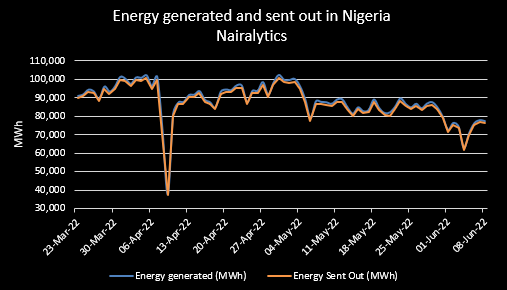
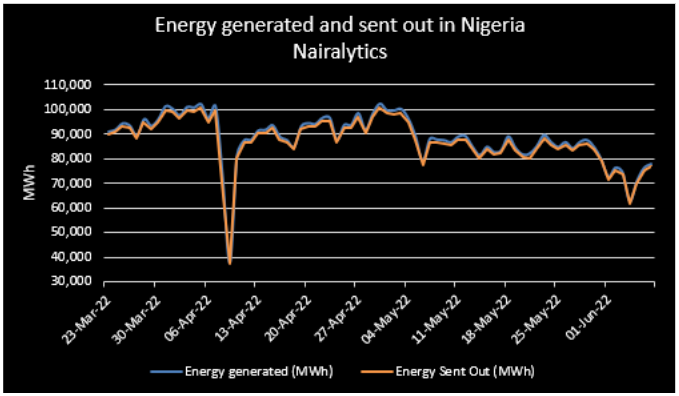
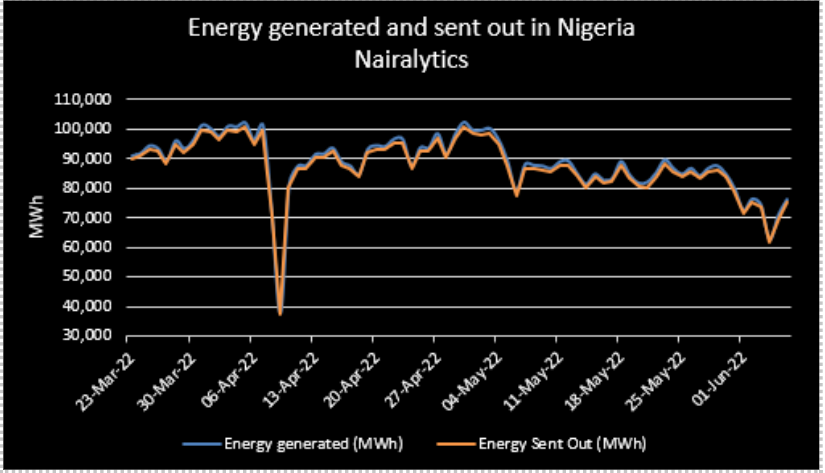
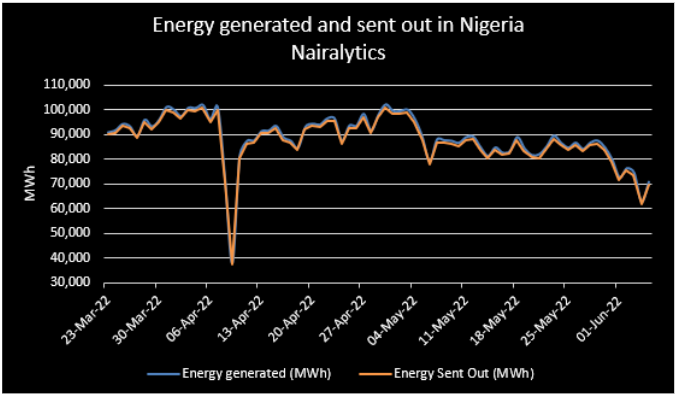
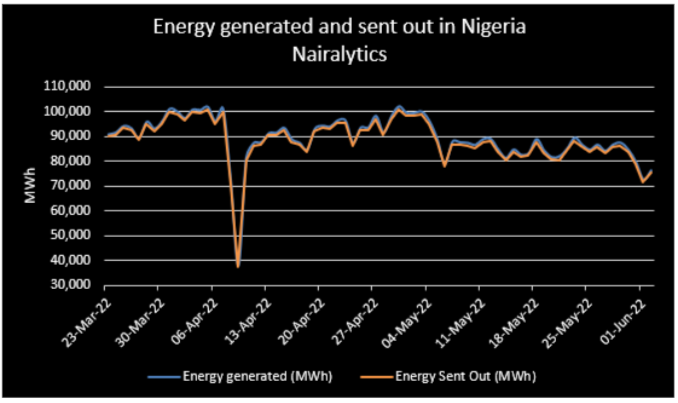
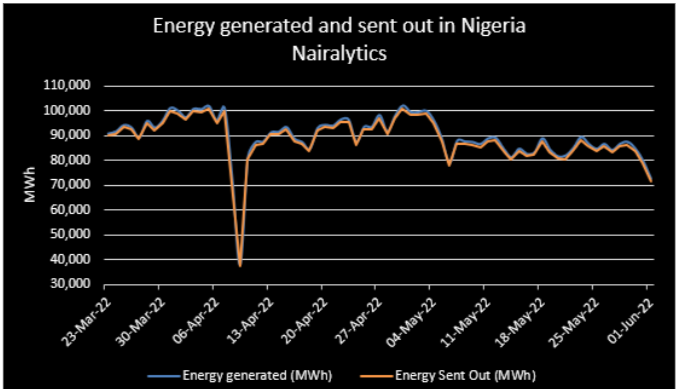



Comments
Post a Comment